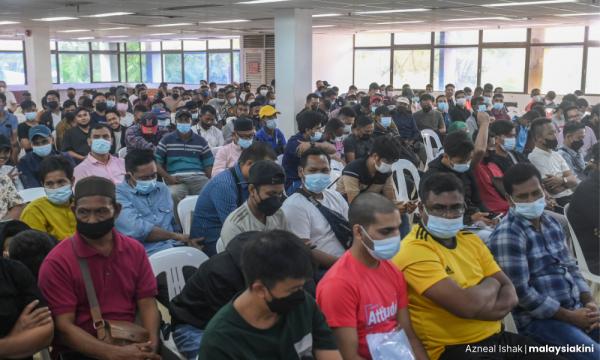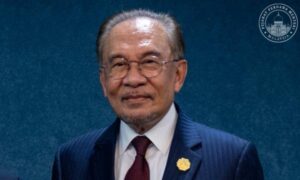YOURSAY | ‘Dignity at work is not a privilege, it is a right for everyone.’
Guan Eng: No need minimum wage, EPF for existing migrant workers
IndigoGoat3056: Bagan MP Lim Guan Eng made a troubling statement in Parliament on Aug 6, asserting that there is no need to mandate the RM1,700 minimum wage or Employees Provident Fund (EPF) contributions for existing migrant workers, arguing that Malaysia is not bound by certain International Labour Organisation conventions.
He further cited Singapore’s exclusion of Central Provident Fund contributions for migrant workers as justification. This is a deeply disappointing position.
The DAP MP, in this case, is operating from a narrow capitalist mindset that clearly contradicts the spirit of the Federal Constitution, fundamental human rights principles, and the values of social justice.
Lim’s statement reflects an economic ideology that prioritises employer profits over fairness for all workers, particularly migrant workers, who are often among the most exploited.
Legally, morally, and constitutionally, this reasoning is flawed.
Malaysia’s Federal Constitution, under Article 8, guarantees that “all persons are equal before the law and are entitled to the equal protection of the law.” This does not limit protection to citizens.
It includes all persons, including non-citizens. Migrant workers who are lawfully present and employed in Malaysia are entitled to this equal protection.
Any policy that denies them basic rights, such as minimum wage or EPF, is discriminatory.
The Court of Appeal in Tak Tek Seng further clarified that the right to life under Article 5 includes the right to livelihood.
Denying migrant workers fair wages and social protection is a denial of that livelihood – and a denial of dignity.
In Kathiravelu Ganesan v Kojasa Holdings Bhd, the Court of Appeal held that a migrant worker qualifies as a “workman” under Malaysian labour law and can bring claims for unfair dismissal under Section 20(1) of the Industrial Relations Act 1967.
If the law recognises their right to challenge unfair dismissal, it must also uphold their right to minimum standards of compensation and retirement protection.
Article 6 prohibits all forms of forced labour, regardless of nationality. Paying migrant workers below the wage floor and denying EPF contributions – while demanding full output – amounts to economic exploitation, in breach of the Constitution.
Furthermore, Article 10 allows migrant workers to be members of trade unions, affirming their recognised role in the national workforce. Article 155 also provides reciprocal rights for Commonwealth citizens – a reminder that migrant workers are not to be treated as second-class.
The idea that existing migrant workers – many of whom have served this country for years – can be excluded from protections just because they were hired earlier is not justifiable.
It rewards employers for locking in unfair contracts and punishes workers who have already contributed significantly to Malaysia’s economy.
Malaysia does not need to wait for international treaties to act justly. Our own Constitution, courts, and conscience demand it.
Migrant workers deserve minimum wage, EPF contributions, and equal labour rights – regardless of when they were hired or where they came from.
Dignity at work is not a privilege; it is a right for everyone.
TMataz: Agree. The minimum wage ruling should apply only to Malaysian citizens.
Applying the same ruling to migrants only distracts from the more urgent focus on alleviating the living wage of our fellow Malaysians.
An average Singaporean’s income is SG$6,000 a month. Sadly, the average income for Malaysians is RM6,000 a month.
I believe Malaysia should strive for at least half of that figure, due to our Malaysian equivalent educational literacy and the lower cost of living, which is why the average Malaysian should be earning RM9,900 per month.
To progressively push the employer to improve their business productivity and retool their operations to meet today’s technological demands, and to be better able to alleviate their Malaysian employees’ income.
It’s not fair to put unfair constraints on local businesses and to force them to pay unreasonably high wages for menial jobs done by migrants.
Thus, if we remove migrants from the national minimum wage ruling, then we are able to fast-track wages for our Malaysian citizen workers to double the current minimum.
If there is a need to placate international labour rules, just do a separate minimum wage requirement for migrants.
Coward: Our ex-finance minister is not showing any knowledge of the market.
Minimum wage and EPF contributions for migrant workers are not there to protect them.
Both are there to prevent them from undercutting locals. If employers don’t have to respect them, then they are cheaper than locals from the employer’s viewpoint.
When that’s the case, who will they employ?
In most countries where employers contribute to pension funds, they are required to give migrant workers what they would have contributed to the funds for locals if they didn’t have to open the same pension fund account for migrant workers.
The people of Selangor: Who came up with the idea of EPF and minimum wages for migrant workers? How will such a policy or ruling benefit our country? What is the purpose of it?
Do we want to encourage more migrant workers to come here? What we see is more illegal workers coming here instead.
We should suggest better policies for local workers instead of migrant workers; these policies will only burden our employers or businesses and increase our cost of living.
BlueGecko7216: Without equal minimum wages for migrants, it will lead to an influx of migrant workers, which is detrimental to local workers.
There will also be an improvement in productivity in general.
The above is a selection of comments posted by Malaysiakini subscribers. Only paying subscribers can post comments. In the past year, Malaysiakinians have posted over 100,000 comments. Join the Malaysiakini community and help set the news agenda. Subscribe now.
These comments are compiled to reflect the views of Malaysiakini subscribers on matters of public interest. Malaysiakini does not intend to represent these views as fact.






